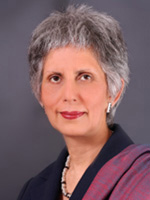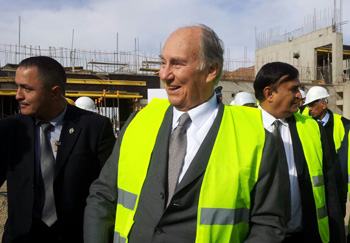
Nurjehan Mawani, Head of Aga Khan Development Network Representation for Kyrgyz Republic tells about AKDN's achievements and objectives in interview to NA AKIpress
Bishkek (AKIpress) - BISHKEK (AKIpress) - Mrs. Nurjehan Mawani, Head of Aga Khan Development Network Representation for the Kyrgyz Republic, in the interview to the NA AKIpress has told about achievements and objectives of AKDN. The full text follows below.
Q:There is an impression, that the policy of Aga Khan Foundation is to highlight the activity as less as possible, to be less demonstrated in public.
A:I can not agree with this. If you go to our website, you will find that it is very comprehensive and provides information about all activities of Aga Khan Development Network. We probably don’t talk too much about our achievements. That is because we believe that the results should speak for themselves and that the beneficiaries of our development programs become the masters of the development process. For us, actions speak louder than words. Thus, we want to make sure that the people, for whom we implement our projects, not only are informed, but also directly participate in them.
Q:It is considered, that primary activity of Aga Khan Foundation is concentrated in educational sphere, construction of the University of Central Asia and new schools. In what other areas and projects the Aga Khan Foundation participates? What are the priorities?
A: On my arrival in Kyrgyzstan, I found that we are mostly known by the public for the work of Aga Khan Foundation. Actually, Aga Khan Foundation is part of the Aga Khan Development Network which I have the honoure to represent in the Kyrgyz Republic. The Aga Khan Development Network is active in more than in 30 countries of the world. Aga Khan Foundation as one of nine agencies of the Aga Khan Development Network and has been active in Kyrgyzstan in social development, especially in the spheres of rural development, health and education.
If I were to speak about general principles, our activity is directed on institutional support and development of human resources. It includes community mobilization and building capacity. The success of each project and sustainability will be ensured where there is direct involvement of community which is more informed about its needs and expectations.
As a whole, our work is based on such principles as institutional development on a long-term and steady basis. We focus attention on the development of the most remote regions which are limited by resources and where often the poorest part of the population lives. Earlier this month, I visited the Aga Khan School in Osh and some of the projects of Mountain Societies Development Support Program (MSDSP) in Alai district. I had an opportunity to see with own eyes the realization of our projects on the grassroots, and to be convinced of their necessity for this region. These include the construction and rehabilitation primary schools, kindergartens, health facilities, and construction of irrigation channels. I witnessed the deep interest and desire of the local communities to build their own future and to become full partners in this process.
In Alai and Chon-Alai, there is also the microfinance program of Aga Khan Agency for Microfinance. This program is aimed at improving incomes and the quality of life of the local population and becoming self-reliant. The program has now been expanded to Naryn oblast.
In the framework of education projects, the Aga Khan School in Osh was established in 2002 and this year the school has received the license of the Ministry of Education for using English language medium for teaching of subjects. In the future, graduates of this school can enter any international educational establishment, and prepare themselves to participate in the global economy. Intensive training programs are conducted for teachers including for state school teachers in order to strengthen capacity.
In the sphere of culture, the Aga Khan Music Initiative for Central Asia (AKMICA) focuses on the preservation and promotion of traditional musical heritage. This is very important especially for societies in transition. I have observed that traditional Kyrgyz music is passed from generation to generation.
Q: If to compare your organization to Soros Foundation, Eurasia Foundation and other institutes of development is there any basic difference exist in approaches to realization of the projects?
A: I am not going to make any comparisons. For me, it is easier to talk about our approach. We tend to have a focused and an integrated approach working in certain sectors in certain regions. This is for maximum effectiveness in improving the quality of life of local communities. Once we know that a certain approach works and we have results, then we consider expanding the activity to other regions. For example, in Kyrgyzstan, we are expanding the micro-credit program and MSDSP currently in Osh oblast to Naryn oblast.
Q: Why have you begun the activity in Alai?
A: In Kyrgyzstan, we are mainly focused on mountain communities. Before deciding where to focus specifically, an in-depth evaluation is carried out. This includes defining the needs, and the resources that are currently available. When I visited the small remote communities in Alai recently, they told me that no other organization was working there.
Q: Now the new government works on the strategy of development of the country, there is a rough discussion of this strategy, but sights are very different. What is your opinion on the given question?
A: We are a member of the donor community. Donors have been working closely with the government in a number of areas, including the country development strategy. As to our direct participation, we regard ourselves to be investors working for the long-term solution of social and economic issues, particularly in remote areas. We work with government and civil society.
Q: How the problems of integration of Central Asian countries and political disagreements between them could influence on the activity of the Aga Khan Development Network?
A: Perhaps, I will answer this question a little differently. Regional cooperation is very important from our perspective. The University of Central Asia is a very important example of this in the region. Mountain communities although they may be divided by borders often have the same problems. Therefore they could cooperate by the sharing of knowledge and experience and develop a common approach to the solution of their issues.
As for the second part of your question, I am not an expert in the field of “conflict-science”, but if we look to what occurs in the world now, we can see the importance of regional cooperation especially in the economic sphere. More often, it is the economic imperative that stimulates regional cooperation. There are issues trade, transport, and transit as well as energy. These were discussed at last year’s CAREC conference in Bishkek. Economic prosperity will likely push people and government to communicate among and between themselves in the language of peaceful dialogue.
Q: What attitudes have been developed with state authorities, whether there are any attempts to obstacle from their part?
A: The government gives us great support. Like everyone else, we sometimes collide with bureaucratic procedures; there are a lot of them like in many countries. As a former civil servant myself, I know that these procedures are often dictated by an aspiration to have a more regulated process. It is important to have simplification and avoid duplication. The main task is to find this balance. As His Highness the Aga Khan has noted that the role of government is to foster an “enabling environment” for development by creating favorable legislative, regulatory and fiscal structures. We are now seeing an era of public–private partnerships. Accountability is also very important.
Q: How have the political events of 2005 and change of the country leaders affected the activity and policy of your organization in Kyrgyzstan?
A: AKDN works here in the framework of a very important Agreement of Cooperation that was signed by the former president and ratified by Parliament. The new government has completely supported the terms of this Agreement.
There was a sense of instability after the events of March, 2005 which were felt by everyone. In my opinion, the situation is more stable now and our programs are not only continuing but expanding. Just in April of this year, we signed a Memorandum of Understanding with the Ministry of Education on Early Childhood Education.
Q: The Aga Khan Foundation associates with Akaev’s family among people. Bermet Akaeva was the coordinator of the Foundation. What are the relations between your organization and family of the former President today?
A: The work of Aga Khan Development Network had the support of the former authorities and has the support of the current government. Our principle is to work with the government of the day. Our purpose is to help improve the quality of life of people in the country. To achieve this, we work with everyone including government, local authorities, business community, and civil society. I am pleased to say that we are supported at all levels.
Regarding Bermet Akaeva, she was program coordinator of Aga Khan Foundation in Kyrgyzstan. As I know, her involvement came to an end when she ran for parliamentary elections.
Q: Could you tell about projects which you plan for the future?
A: We are currently considering expansion in sphere of microfinance, education and banking sector. As well, we are considering possible participation of Aga Khan Fund for Economic Development (AKFED) in telecommunication sector. We are also interested in supporting high-quality tourism development. Issyk-Kul is a very unique geophysical unit. AKFED has a lot of experience in the tourism sector. Our interest in the sphere of tourism in many countries is first of all, directed on the support of economic development. It also focuses on the preservation of ecological and cultural values of the country.
We have conducted expert study on the development of tourism in Issyk-Kul and we are considering organizing a special conference to discuss the recommendations of the study. The conference would involve the participation of all stake-holders. The purpose would be to develop a common strategy for the development of an all-year round, high-quality, and sustainable tourism industry. The conference would use available experience from such development in other countries. AKDN’s own focus would be directed at the development of human resource capacity for the tourism and related industry. It is also very important to have an enabling legal and regulatory framework.
Q: You have mentioned the project in telecommunication sector, is there any experience in the given sector in other countries?
A: AKFED has a lot of experience in this sector. It is already working successfully in the region, including Afghanistan, Tajikistan, and Uzbekistan. It has considerable experience in providing high-quality and reliable service in remote mountain regions. In Afghanistan, for example, “Roshan” which is part of AKFED started to cover not just Kabul, but distant mountain areas. The participation in telecoms sector is part of AKDN’s socio-economic development strategy.
Q: Does it mean that the telecommunication project in these countries is designated by one company?
A: In each country there is a separate company which works with different partners providing technical support. We are able to attract a lot of investment. The quality, reliability, and security of the service are a priority. As well, priority is given to the development of local human capacity. An example of this is the call-center in Kabul where the local employees receive specialized training. Many of them are former refugees who have returned to the country when the civil war ended.
Q: Initiative on pluralism is one of the latest initiatives of AKDN. What is the essence of that?
A: If we look around at the world today, it is clear that most of the tension and conflicts are based on misunderstanding among different ethnic and religious groups. These conflicts are caused by a lack of tolerance and respect for diversity. This causes big divisions in society. AKDN’s work in sphere of development shows that pluralism is an essential part of the infrastructure for development.
His Highness the Aga Khan is establishing the Global Centre for Pluralism in Canada. His Highness has promoted pluralism for many years as an “integral component of peace, security and human development”. As His Highness the Aga Khan said in one of his speeches: “Tolerance, openness and understanding towards other people’s cultures, social structures, values and faiths are now essential to the very survival of an interdependent world”.
The support for pluralism is an integral part of our development approach. This includes the Aga Khan Humanities Project (AKHP) in Kyrgyzstan. This project promotes pluralism in ideas, cultures, and peoples through the implementation of innovative humanities courses based upon the cultural traditions and influences of Central Asia. While being an educational program, it was established as an inter-civilization dialogue. I think this is critical in today’s world so that we can better understand each other and work together in the common interest of humanity.
17:31 09-10-2006


